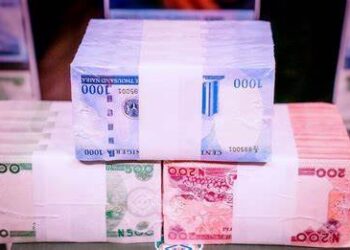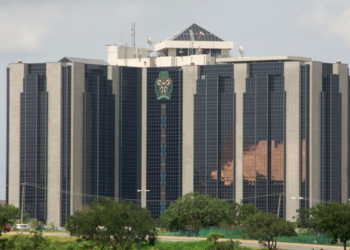The Central Bank of Nigeria (CBN) has finally granted Deposit Money Banks the approval to directly debit bank accounts belonging to loan defaulters across all banks in the country.
The CBN Director, Banking Supervision, Ahmed Abdullahi made the disclosure on Thursday while briefing Journalists at the end of the bankers’ committee meeting.
The details: According to the CBN, the approval became necessary as a new measure to mitigate the rising spate of Non-Performing Loans. It should also be noted that concerns had been mooted in recent times as the CBN’s new policy directed banks to lend up to 65% of deposits to the real sector of the economy.
[READ ALSO: Total loans in Nigeria’s banking sector hit N15.35 trillion]
Speaking after the banker’s committee meeting, the CBN Director stated that as the apex bank was encouraging banks to lend, the CBN was also poised to defend banks against possible future loan defaulters.
A new Clause: At the end of the bankers’ meeting, it was also learned that the CBN approved that the clause permitting banks to apply the new measure as part of loan agreements to all customers.
Abdullahi’s statement reads: “To encourage the banks to lend, the CBN has agreed that there will be a clause that an obligor will sign that will enable the bank net off against any amount he or she has in any other bank.”
Reacting to the approval from the CBN, the Executive Director, Risk, Standard Chartered Bank, Mubola Faloye, reportedly said the new CBN 65% loan to deposit ratio would force banks to lend to some vulnerable sectors and it is important for the apex bank to help deposit money banks mitigate the risk.
“One of things the committee reiterated is that there are some vulnerable sectors the committee will be lending to and it’s important that we mitigate our risks and have what we call a credit cross-default clause that allows us to net off the obligations of defaulting party against any other money the defaulting party has in the industry. That is good support from the CBN for the banking community and it’s very important for us to include that clause in our loan agreement,” Faloye was quoted as saying.
The Backstory: Earlier in May 2019, as published on Nairametrics, the bankers’ committee disclosed plans to go tough on efforts to bring loan defaulters to book. According to the committee, plans have been perfected to go beyond publishing the names of defaulters. This time, all banks would be speaking with one voice, sharing information about those entities, and refusing to do further business with them until they settled their obligations.
- Similarly, the CEO addressed smear campaigns by defaulters which are always targeted at banks and their CEOs in a desperate bid to either delay repaying loans or avoid meeting their debt obligations completely.
- While the banks have been increasing efforts to reduce bad loans, the CBN introduced a 65% loan to deposit ratio – a policy which means bad loans may surge.
- Nairametrics was first to publish that the CBN had reviewed the earlier 60% LDR to 65%.
- According to the CBN, the major reason for the newly revised LDR was the noticeable “growth in the level of the industry gross credit”.
[READ ALSO: A total of 34.7 million bank accounts are not yet linked to BVNs]
How this affects you: With the latest approval granted by the CBN to banks, loan defaulters who have funds in accounts across any bank in the country should expect debit alert from their respective banks any moment from now.
- The new approval also means that for interested loan applicants, a new clause has been introduced, which mandates you to give consent to your bank to debit your accounts in any Nigerian bank where you have funds in the event of you defaulting.
- Although, the right to setoff account balances has existed among banks in the past but hasn’t been operational.
- It was learned that once a customer defaults on their loans, relying on BVN, NIBSS will first recover the loans from the defaulter’s balance in any account within the bank. If that is not enough, it will proceed to other accounts deposited in other banks.
In the meantime, this move by the CBN is expected to drive down the huge non-performing loans in Nigerian banks and also strengthen the country’s financial sector.
























Good move by the apex bank. Does this apply to MFBs too, as they do lots of lending too
i believe will also apply Microfinance
Microfinance banking is full reserve banking. I doubt it.
Nigerians will beat the system still. People will hide their monies in their spouses accounts, in their children’s accounts, etc. The environment for doing business in Nigeria encourages defaulting. A barber runs his generator 24/7. And so do most businesses. Money spent buying diesel in coldrooms can pay off loans. Nigerian government is not serious. Banks will still cry.
^^^This your reason does not justify defaulting on loans. It is an agreement between parties that must be honored.
The business environment in Nigeria is terrible. U take a loan for a business, and now no electricity Inthe environ for upward of 6mths. The generator purchased to support PHCN has finally broken down due to overuse. The road to your business has become so bad that the only means of transporting goods was to hire transport cos company vehicle is now unserviceable, customers are not ready to come around cos of bad road unless u deliver. Imagine the additional cost on production cost which u cannot pass to customers cos of competition. Remember unexpected increase in vat, bank deposit/withdraw charges etc. In Nigeria as SME, u are not protected. The disposable income of ur customers is limited perhaps reducing. Hence d default to loan repayment. I suggest BOI should do due diligence and spread loan repayment over a longer period and if possible, reschedule the loan for a soft landing.